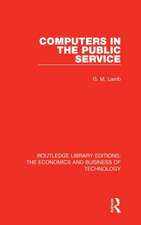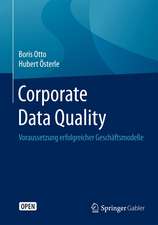Designing Data Spaces: The Ecosystem Approach to Competitive Advantage
Editat de Boris Otto, Michael ten Hompel, Stefan Wrobelen Limba Engleză Hardback – 22 iul 2022
To this end, the book is structured in four parts: Part I “Foundations and Contexts” provides a general overview about building, running, and governing data spaces and an introduction to the IDS and GAIA-X projects. Part II “Data Space Technologies” subsequently details various implementation aspects of IDS and GAIA-X, including eg data usage control, the usage of blockchain technologies, or semantic data integration and interoperability. Next, Part III describes various “Use Cases and Data Ecosystems” from various application areas such as agriculture, healthcare, industry, energy, and mobility. Part IV eventually offers an overview of several “Solutions and Applications”, eg including products and experiences from companies like Google, SAP, Huawei, T-Systems, Innopay and many more.
Overall, the book provides professionals in industry with an encompassing overview of the technological and economic aspects of data spaces, based on the International Data Spaces and Gaia-X initiatives. It presents implementations and business cases and gives an outlook to future developments. In doing so, it aims at proliferating the vision of a social data market economy based on data spaces which embrace trust and data sovereignty.
| Toate formatele și edițiile | Preț | Express |
|---|---|---|
| Paperback (1) | 318.80 lei 6-8 săpt. | |
| Springer International Publishing – 22 iul 2022 | 318.80 lei 6-8 săpt. | |
| Hardback (1) | 310.98 lei 3-5 săpt. | +41.80 lei 5-11 zile |
| Springer International Publishing – 22 iul 2022 | 310.98 lei 3-5 săpt. | +41.80 lei 5-11 zile |
Preț: 310.98 lei
Preț vechi: 388.72 lei
-20% Nou
Puncte Express: 466
Preț estimativ în valută:
59.51€ • 61.90$ • 49.13£
59.51€ • 61.90$ • 49.13£
Carte disponibilă
Livrare economică 24 martie-07 aprilie
Livrare express 08-14 martie pentru 51.79 lei
Preluare comenzi: 021 569.72.76
Specificații
ISBN-13: 9783030939748
ISBN-10: 303093974X
Pagini: 580
Ilustrații: XV, 580 p. 151 illus., 140 illus. in color.
Dimensiuni: 155 x 235 x 40 mm
Greutate: 1.01 kg
Ediția:1st ed. 2022
Editura: Springer International Publishing
Colecția Springer
Locul publicării:Cham, Switzerland
ISBN-10: 303093974X
Pagini: 580
Ilustrații: XV, 580 p. 151 illus., 140 illus. in color.
Dimensiuni: 155 x 235 x 40 mm
Greutate: 1.01 kg
Ediția:1st ed. 2022
Editura: Springer International Publishing
Colecția Springer
Locul publicării:Cham, Switzerland
Cuprins
Part I: Foundations and Context.- 1. The Evolution of Data Spaces.- 2. How to Build, Run, and Govern Data Spaces.- 3. International Data Spaces in a Nutshell.- 4. Role of Gaia-X in the European Data Space Ecosystem.- 5. Legal Aspects of IDS: Data Sovereignty—What Does It Imply?.- 6. Tokenomics: Decentralized Incentivization in the Context of Data Spaces.- Part II: Data Space Technologies.- 7. The IDS Information Model: A Semantic Vocabulary for Sovereign Data Exchange.- 8. Data Usage Control.- 9. Building Trust in Data Spaces.- 10. Blockchain Technology and International Data Spaces.- 11. Federated Data Integration in Data Spaces.- 12. Semantic Integration and Interoperability.- 13. Data Ecosystems: A New Dimension of Value Creation Using AI and Machine Learning.- 14. IDS as a Foundation for Open Data Ecosystems.- 15. Defining Platform Research Infrastructure as a Service (PRIaaS) for Future Scientific Data Infrastructure.- Part III: Use Cases and Data Ecosystems.- 16. Silicon Economy:Logistics as the Natural Data Ecosystem.- 17. Agricultural Data Space.- 18. Medical Data Spaces in Healthcare Data Ecosystems.- 19. Industrial Data Spaces.- 20. Energy Data Space.- 21. Mobility Data Space.- Part IV: Solutions and Applications.- 22. Data Sharing Spaces: The BDVA Perspective.- 23. Data Platform Solutions.- 24. FIWARE for Data Spaces.- 25. Sovereign Cloud Technologies for Scalable Data Spaces.- 26. Data Space Based on Mass Customization Model.- 27. Huawei and International Data Spaces.- International Collaboration Between Data Spaces and CarrierNetworks.- 29. From Linear Supply Chains to Open Supply Ecosystems.- 30. Data Spaces: First Applications in Mobility and Industry.- 31. Competition, Security, and Transparency: Data in Connected Vehicles.- Data Space Functionality.- The Energy Data Space: The Path to a European Approach for Energy.
Notă biografică
Boris Otto is the Executive Director of the Fraunhofer Institute for Software and Systems Engineering ISST in Dortmund as well as Chair for Industrial Information Management at TU Dortmund. His career path includes the University of St. Gallen, PricewaterhouseCoopers, SAP, and the Fraunhofer Institute for Industrial Engineering IAO. He is a member of the boards of directors of the Gaia-X, European Association for Data and Cloud, AISBL and the International Data Spaces Association (IDSA). His research focuses on the fields of industrial information management, business and logistics networks, and methods for the design of digital business solutions.Michael ten Hompel holds the Chair of Materials Handling and Warehousing at TU Dortmund and is Managing Director at Fraunhofer-Institute of Material Flow and Logistics IML. Besides his work as scientist, he also worked as entrepreneur and eg founded GamBit GmbH in Dortmund in 1988 and is still on the supervisory board of several logistics companies. He was also awarded the Innovationspreis NRW (Innovation Award North Rhine-Westphalia) in 2020.
Stefan Wrobel is Professor of Computer Science at U Bonn and Director of the Fraunhofer Institute for Intelligent Analysis and Information Systems IAIS. His work is focused on questions of the digital revolution, in particular intelligent algorithms and systems for the large-scale analysis of data and the influence of Big Data/Smart Data on the use of information in companies and society. He was honored by the Gesellschaft für Informatik (German Informatics Society) as one of the formative minds in German AI history.
Stefan Wrobel is Professor of Computer Science at U Bonn and Director of the Fraunhofer Institute for Intelligent Analysis and Information Systems IAIS. His work is focused on questions of the digital revolution, in particular intelligent algorithms and systems for the large-scale analysis of data and the influence of Big Data/Smart Data on the use of information in companies and society. He was honored by the Gesellschaft für Informatik (German Informatics Society) as one of the formative minds in German AI history.
Textul de pe ultima copertă
This open access book provides a comprehensive view on data ecosystems and platform economics from methodical and technological foundations up to reports from practical implementations and applications in various industries.
To this end, the book is structured in four parts: Part I “Foundations and Contexts” provides a general overview about building, running, and governing data spaces and an introduction to the IDS and GAIA-X projects. Part II “Data Space Technologies” subsequently details various implementation aspects of IDS and GAIA-X, including eg data usage control, the usage of blockchain technologies, or semantic data integration and interoperability. Next, Part III describes various “Use Cases and Data Ecosystems” from various application areas such as agriculture, healthcare, industry, energy, and mobility. Part IV eventually offers an overview of several “Solutions and Applications”, eg including products and experiences from companies like Google, SAP, Huawei, T-Systems,Innopay and many more.
Overall, the book provides professionals in industry with an encompassing overview of the technological and economic aspects of data spaces, based on the International Data Spaces and Gaia-X initiatives. It presents implementations and business cases and gives an outlook to future developments. In doing so, it aims at proliferating the vision of a social data market economy based on data spaces which embrace trust and data sovereignty.
Overall, the book provides professionals in industry with an encompassing overview of the technological and economic aspects of data spaces, based on the International Data Spaces and Gaia-X initiatives. It presents implementations and business cases and gives an outlook to future developments. In doing so, it aims at proliferating the vision of a social data market economy based on data spaces which embrace trust and data sovereignty.
Caracteristici
This book is open access, which means that you have free and unlimited access Provides an encompassing overview of the technological and economic aspects of data spaces Presents implementations and business cases and gives an outlook to future developments Offers an overview of solutions and applications from companies like Google, SAP, Huawei, T-Systems and many more


























